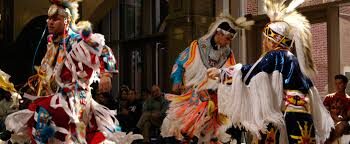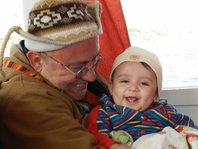 Before I was twenty-one, I had be been born, raised, educated and lived on five continents. Despite the dizzying array of languages, cultures, and creeds, I have seen past their looking glasses, never forgetting what my Nez Perce heritage, a gift of my father’s family that has claimed my very soul. A large portion of my formative years though was spent in Arizona and California, places that made their irrevocable imprint on my future path. More specifically, it ignited my passion for Native American culture, religion, tradition, values and beliefs. While I show few signs of my genetic lineage in terms of visage, spiritually I am drawn to my culture. Moreover, I am convinced that humankind has lost our connection to the spiritual, our connection to the land, and the belief that all things are alive. For me, to believe otherwise lessens me as an individual.
Before I was twenty-one, I had be been born, raised, educated and lived on five continents. Despite the dizzying array of languages, cultures, and creeds, I have seen past their looking glasses, never forgetting what my Nez Perce heritage, a gift of my father’s family that has claimed my very soul. A large portion of my formative years though was spent in Arizona and California, places that made their irrevocable imprint on my future path. More specifically, it ignited my passion for Native American culture, religion, tradition, values and beliefs. While I show few signs of my genetic lineage in terms of visage, spiritually I am drawn to my culture. Moreover, I am convinced that humankind has lost our connection to the spiritual, our connection to the land, and the belief that all things are alive. For me, to believe otherwise lessens me as an individual.
In recent months, I have been in contact with several respected individuals within the field of Native American Studies. At first, I investigated the option of pursuing counseling as an academic path, but this, like so many innumerable reasons in the past why I did not pursue my truest interest, led me to the conclusion that NAS was exactly where I needed to be. NAS is a subject that has been my passion and an intrinsic part of me for decades; something deeper has brought me than simply a need to remember.
Indeed, I have been formulating for years the very basis for my research interests, particularly the Shamanistic influence and the effect or lack thereof upon Native American life. Moreover, I have seen distinct causal relationships between the influences of Native American culture and religion and current Western as well as Far-Eastern beliefs, though this is possibly a phenomenon similar to dual architectural synthesis. Recently there has been a resurgence of the pipe, the sweat and the vision quest as well as the influence of the “two-spirited” people in Native culture as a means to reawaken individual awareness. In the past, the Shaman acted as a spiritual guide, versed in all of these matters, a person of great esteem, privilege and position. The seasons of time though took all that they had come for, eroding the Shamans’ position. Only a deeper understanding of ourselves can come of investigating in detail the recent reawakening of interest and, frankly, relevance, of the Shaman and all that they represent in terms of culture, the most profound ideas of why we are here, right now, on earth. It is with great hope that I hypothesize that this generation is seeking a reconnection with their own respective heritages; greater things burn within the current generation than simply monetary ambitions.
Equipped with a graduate degree in NAS, my path to a doctorate will be assured, enabling me to bring my goals of teaching at a college or university to fruition. The ideal position would enable me to continue researching, publishing my findings, theories and thoughts and educating burgeoning students. Much more than this, though, I would be a mentor and teacher, influencing students as a guide, giving them the gift of insight into the common threads of values and beliefs of their own cultures. To accomplish this, I will be empowering others to embrace their own heritage, shaking off social convention and emboldening them to stare down prejudice in the name of pride for who they are.
While universities are inundated with countless applications from highly qualified candidates, I bring with me a higher level of maturity, seriousness, diversity, and cultural involvement. How can you explain in the classroom the experience of birth, death, being mentored in life’s values by an Apache Indian, or spending freezing nights alongside the Yukon River in the company of Athabasca elders, with winter dancing in and out of our tents, places so quiet you can hear your thoughts touching every second that you spend waiting for the morning. What scholars and academicians can only examine through theory, I have lived. Three decades have past since I established my academic foundation in Philosophy and Biology. I bring with me to the classroom life experiences that span the globe, a rich heritage, and literally thousands of hours of personal study in Native American studies.
Volunteerism has been a large feature in my life, finding me involved with Boy Scouts of America, acting as an advisor and committee member for advancement. In the spirit of my ancestry, the proud Nez Perce horse breeding that was all but destroyed in the 1800s, I have acted as a pro bono advisor to the 4H Club and several FFA groups teaching horsemanship and equine-related studies. In professional terms, I have been involved with many Native communities in central Alaska and Arizona, volunteering my services as a pilot, driver and guide throughout most of my adult life. From all of my experiences, I have been blessed with many friendships, but have been instrumental in increasing an understanding of a people oft ignored. It is not a case of being proud of what we were, the Native American remains, is alive and well, and is eager to give back.
XXXX University’s Department of NAS is my sole choice for scholastic development. Having contacted the department, explaining my intentions, I have only been left all the more encouraged of a superlative education enhanced by a curriculum that is broad and autonomous. While most schools primarily consider academic achievements, I respectfully ask that my lifetime of experiences, a life that few men can even dream of, the scars of my life, and the heart and mind that carries practical exposure to the cultures and traditions of countless people into consideration.
I look forward to my future with XXXXU, and find it only fitting that Montana, the very place where the Nimíipuu called home, and Chief Joseph brought America’s last conflict with Native Americans to an end should be the place that I begin my pursuit of professorship in an exciting era of great change.
Thank you for your time and consideration.

